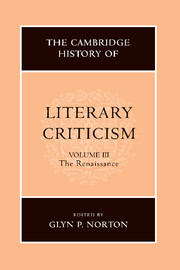Book contents
- Frontmatter
- Introduction
- READING AND INTERPRETATION: AN EMERGING DISCOURSE OF POETICS
- POETICS
- THEORIES OF PROSE FICTION
- CONTEXTS OF CRITICISM: METROPOLITAN CULTURE AND SOCIO-LITERARY ENVIRONMENTS
- VOICES OF DISSENT
- STRUCTURES OF THOUGHT
- NEOCLASSICAL ISSUES: BEAUTY, JUDGEMENT, PERSUASION, POLEMICS
- A SURVEY OF NATIONAL DEVELOPMENTS
- 56 Seventeenth-century English literary criticism: classical values, English texts and contexts
- 57 French criticism in the seventeenth century
- 58 Literary-critical developments in sixteenth-and seventeenth-century Italy
- 59 Cultural commentary in seventeenth–century Spain: literary theory and textual practice
- 60 The German-speaking countries
- 61 The Low Countries
- Bibliography
- Index
- References
58 - Literary-critical developments in sixteenth-and seventeenth-century Italy
from A SURVEY OF NATIONAL DEVELOPMENTS
Published online by Cambridge University Press: 28 March 2008
- Frontmatter
- Introduction
- READING AND INTERPRETATION: AN EMERGING DISCOURSE OF POETICS
- POETICS
- THEORIES OF PROSE FICTION
- CONTEXTS OF CRITICISM: METROPOLITAN CULTURE AND SOCIO-LITERARY ENVIRONMENTS
- VOICES OF DISSENT
- STRUCTURES OF THOUGHT
- NEOCLASSICAL ISSUES: BEAUTY, JUDGEMENT, PERSUASION, POLEMICS
- A SURVEY OF NATIONAL DEVELOPMENTS
- 56 Seventeenth-century English literary criticism: classical values, English texts and contexts
- 57 French criticism in the seventeenth century
- 58 Literary-critical developments in sixteenth-and seventeenth-century Italy
- 59 Cultural commentary in seventeenth–century Spain: literary theory and textual practice
- 60 The German-speaking countries
- 61 The Low Countries
- Bibliography
- Index
- References
Summary
Critical speculation about the arts and, more particularly, about literature attained a level of high sophistication in sixteenth- and seventeenth-century Italy, as social and economic growth within a dozen or so city-states gave rise to concurrent intellectual flowering, focused around self-conscious movements. The most influential of these movements was humanism, and more specifically two types of humanism: civic humanism, with its philosophy of vita activa-politica [active-olitical life] by which literature and civic life were drawn together in clear opposition to the ideals of scholarly withdrawal encouraged by Platonism; and vernacular humanism, with its defence of the vernacular against Latin as well as of the Moderns against the Ancients, ‘encouraging the moderns to seek to rival antiquity in their vernacular languages and literatures’. After imitating the Ancients, philosophers and poets dared to surpass them: the generation of Marsilio Ficino was succeeded by that of Pico della Mirandola and Poliziano.
While Florence could justifiably lay claim to being the cradle of civic humanism, it was in Venice that the largely theoretical dimension of Florentine speculation on the role of the city-state matured into what became a way of life envied by Western intellectuals everywhere. The Venetian aristocracy's focus on civil and commercial activity that had stunted letters during the thirteenth and fourteenth centuries, made it, by the fifteenth and sixteenth centuries, Europe's best-educated ruling class. Even if the philological production of the Florentine studium, with the rise of commercial printing, dominated the Quattrocento by the century's close, Venice emerged as the hub of European cultural endeavours.
- Type
- Chapter
- Information
- The Cambridge History of Literary Criticism , pp. 566 - 577Publisher: Cambridge University PressPrint publication year: 1999



